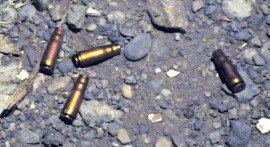
When dengue broke out, Javed decided to spray his house with insecticide so his kids could sleep safely without fear of being infected with the disease by carrier mosquitoes.
So he bought a packet of lambda cyhalothrin or a “powder packet”, as it is known locally – mixed it with diesel and started spraying. But as he finished, he realised that the tank strapped to his back carrying the chemical had leaked and soaked through his shirt. He felt a burning sensation on his skin, which over the next day developed into a rash and an acute pain too severe to ignore.
“The doctor told me that the chemical had penetrated my skin and was affecting the flesh underneath. I could not lie down or sit with my back touching anything. It was terrible,” said Javed, a driver by profession. The doctor gave him a soothing balm and after a couple of days, the pain had gone.
(Read: ‘Heavy use of pesticide causes many deaths’)
Insecticide can be extremely harmful to human health and in the midst of the dengue outbreak, dermatologists are reporting an uptick in the number of patients they are getting with skin rashes and eczema. “In extreme cases, it can be absorbed through the skin and even damage flesh and bones,” said Dr Atif Kazmi, a dermatologist at Mayo Hospital.
He said the number of patients he’d been getting with allergic reactions had soared since dengue broke out. Many if not most of them are professional pesticide applicators, he said.
This correspondent sought to find out what government department is responsible for monitoring domestic-use pesticides. It turns out that there is none.
Powder packet
Lambda cyhalothrin is the most commonly used chemical in insecticide sprays in Pakistan.
“It is the cheapest and most popular,” said Ali Jawad Khalid, a manager at Ali Akbar Group, a domestic insecticide manufacturer that also uses lambda cyhalothrin.
“But people tend not to realise that if not used in recommended doses, it can be extremely hazardous. There is a need for stringent registration and monitoring,” said Khalid.
Entomologist Muhammad Saeed says lambda cyhalothrin is more harmful than other pesticides because it remains in the body for up to three months, while others decompose in a week.
The World Health Organisation (WHO) and the US Environmental Protection Agency recommend that it only be applied by professionals and used in small doses.
In Pakistan, there is no check on the use of the chemical in domestic-use pesticides. Officials of the environment, agriculture, health and industries department confirmed that they do not regulate the manufacture of insecticides for domestic use and chemicals imported for the purpose.
Low literacy rates mean that many people using powder packets cannot read the instructions and so don’t know about its hazards. The powder is sold in the form of concentrated emulsifier, meaning it has to be diluted with an aromatic organic compound such as benzene or xylene, which are carcinogenic themselves.
Manufacturers have to register and get permission for import and production of agriculture pesticides. Agriculture Department inspectors visit private factories to monitor the quality and proportions of chemicals used.
Agriculture Secretary Arif Nadeem said that agricultural pesticides were monitored under the Agriculture Ordinance 1971, but there was no such law for pesticides for domestic use. Industries Secretary Dr Shujaat Ali said he did not know who monitored the sector.
Nawaz, a sanitary shop owner in Ichhra Market, said the price of lambda cyhalothrin had risen to between Rs70 and Rs200 per packet.
Environmental Protection Agency Director Tauqueer Qureshi said that city government fumigators were given protective clothing and masks so they were safe from the insecticides. He said the pesticides used by the government did not harm the environment.
He said that the EPA was busy with the dengue crisis and did not have the time to investigate the effects of insecticide spraying.
The city government uses deltamethrin and permethrin in its insecticide sprays. Temephos, a natural synthetic compound, is put in stagnant water to kill mosquito larvae.
Muhammad Aslam sprays homes in DHA and Model Town. He is used to the burning sensation and the coughing that comes with inhalation of the chemical. “I cover myself fully and wear a gas mask,” he said.
He advises washing skin that comes into contact with insecticide with water and applying mustard oil to reduce the itchiness. “In case of inhalation, the hakeem prescribes something salty and spicy, such as pickle,” he says.
Published in The Express Tribune, October 7th, 2011.
COMMENTS (2)
Comments are moderated and generally will be posted if they are on-topic and not abusive.
For more information, please see our Comments FAQ







1727242833-0/Untitled-design-(41)1727242833-0-270x192.webp)









No one in the Govt or any dept is talking about that some sprays is very hazards.Innocent people is talking about (mere ghar par to spray nahi huwa) low literacy rates mean that many people using powder packets cannot read the instructions and so don’t know about its hazards this is the best line ...THANKS for educating us...
The sprays imported from India are the worst among all the allergy causing sprays. Indians are probably used to these chemicals so they work in India.